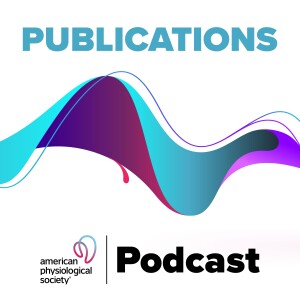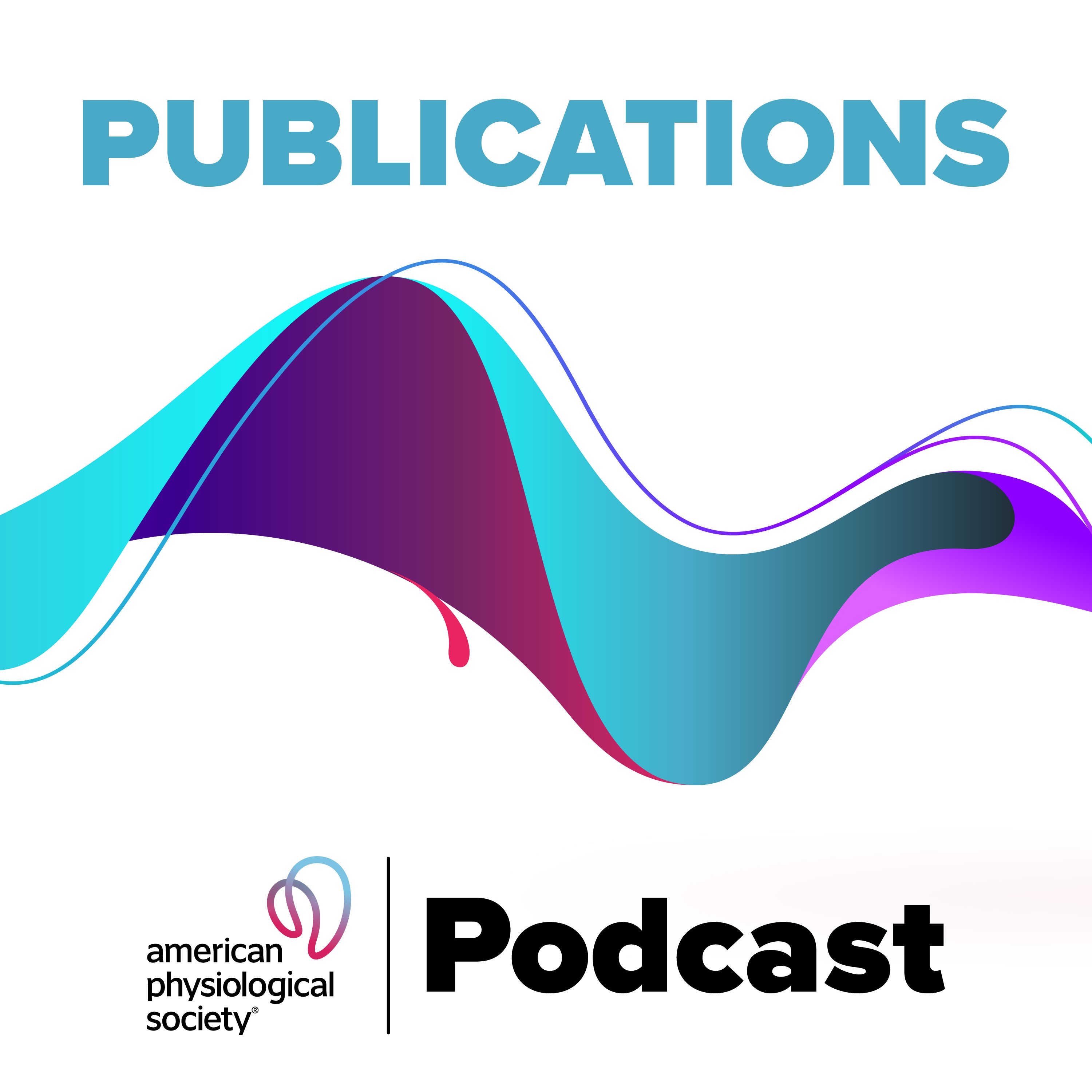Episodes

Monday Aug 11, 2025
Racial and Sex Differences in Cardiac Autonomic Function
Monday Aug 11, 2025
Monday Aug 11, 2025
In this episode of the APS Publications Podcast, featuring an article from AJP–Regulatory, Integrative and Comparative Physiology, authors Ziba Taherzadeh and Claire Kissell discuss the influence of race and sex and Cardiac autonomic function. Their study found that non-Hispanic Black adults living in the United States are more likely to develop cardiovascular disease compared with their non-Hispanic White adult counterparts. These results support that reduced cardiac autonomic function does not manifest early in life among young non-Hispanic Black adults, but rather non-Hispanic Black men had greater spontaneous cardiac baroreflex sensitivity and heart rate variability compared with non-Hispanic White men. No differences were found among women.
Taherzadeh Z, Kissell CE, Young BE, Alhalimi TA, Stephens BY, Kaur J, Kao Y, Brothers RM, Fadel PJ. Cardiac autonomic function in young, healthy adults: Influence of race and sex. Am J Physiol Regul Integr Comp Physiol. 2025 May 1;328(5):R611-R618. https://doi.org/10.1152/ajpregu.00288.2024

Monday Aug 11, 2025
PVN Neurons in Estradiol Treated Middle-Aged Mice
Monday Aug 11, 2025
Monday Aug 11, 2025
In this episode of the APS Publications Podcast, featuring an article from AJP–Regulatory, Integrative and Comparative Physiology, authors Andrea Zsombok, Lucie Desmoulins, and Adrien Molinas discuss the role of estradiol treatment in regulating metabolism and glucose homeostasis. In their study with middle-aged, high-fat diet-fed, ovariectomized female mice, the authors found that liver-related neurons in the hypothalamus became more excitable. Estradiol treatment reduced this excitability, suggesting that midlife estradiol therapy may support healthier brain-liver metabolic regulation.
Molinas AJR, Desmoulins LD, Dugas CM, Williams GL, Kamenetsky S, Felintro de Souza V, Maroteaux MJ, Davis RK, Daniel JM, Schrader LA, Zsombok A. Midlife estradiol treatment reduces the firing rate of liver-related PVN neurons in ovariectomized high-fat diet-fed mice. Am J Physiol Regul Integr Comp Physiol. 2025 Aug 1;329(2):R245-R252. https://doi.org/10.1152/ajpregu.00117.2025

Wednesday Jul 30, 2025
Gut Microbes, Risperidone, and a New Therapeutic Path
Wednesday Jul 30, 2025
Wednesday Jul 30, 2025
In this episode of The APS Publications Podcast, coauthors Matthew A. Hadiono, Alexis B. Kazen, Fatima A. Aboulalazm, and John R. Kirby discuss their recent study, "Reutericyclin mitigates risperidone-induced suppression of anaerobic energy expenditure," published in AJP–Regulatory, Integrative and Comparative Physiology.
The authors explore how the gut microbiome, a thermogenic biomass, plays a critical role in regulating energy expenditure. Their study shows that the composition of the microbial community, influenced by both xenobiotics and bacterial metabolites, can impact metabolic function. They found that treatment with reutericyclin counteracts the suppression of anaerobic energy expenditure caused by risperidone. These findings suggest that reutericyclin may offer a new therapeutic approach for managing obesity.
Tune in to learn more about the gut microbiome’s role in energy balance and the potential for microbiota-targeted therapies.
American Journal of Physiology-Regulatory, Integrative and Comparative Physiology 2025 328:6, R741-R757

Wednesday Jul 30, 2025
The Link Between Vitamin D and Sleep
Wednesday Jul 30, 2025
Wednesday Jul 30, 2025
In this episode of The APS Publications Podcast, coauthors John J. Durocher and Ezra Mutai discuss the Editorial Focus titled "Sleep tight with vitamin D’s might" published in AJP–Regulatory, Integrative and Comparative Physiology. The conversation centers on a recent study by Culver et al., which examines the relationship between vitamin D levels and reduced sleep variability.
Tune in to hear how these findings shed light on the potential link between vitamin D status and consistent sleep patterns.
American Journal of Physiology-Regulatory, Integrative and Comparative Physiology 2025 328:5, R557-R558

Wednesday Jul 30, 2025
Exploring CYP450 Pathways in Functional Sympatholysis
Wednesday Jul 30, 2025
Wednesday Jul 30, 2025
In this episode of The APS Publications Podcast, coauthors Alexander A. Buelow and J. Mikhail Kellawan discuss their recent study, "Inhibition of CYP450 pathways reduces functional sympatholysis in healthy young adults," published in AJP–Regulatory, Integrative and Comparative Physiology.
They explore how functional sympatholysis, which has traditionally been considered independent of nitric oxide and prostaglandins, may actually involve endothelial CYP450 pathways. Their findings show that inhibition of CYP450-2C9 reduces sympatholytic responses during dynamic handgrip exercise combined with lower body negative pressure. This suggests that CYP450 plays an important role in regulating blood flow during exercise in healthy individuals.
Tune in for insights into vascular physiology, research methodology, and the broader implications of these findings for cardiovascular research.
American Journal of Physiology-Regulatory, Integrative and Comparative Physiology 2025 328:6, R642-R650

Monday Jul 28, 2025
Interorgan Insights: Leukotrienes in Asthma-IBD Axis
Monday Jul 28, 2025
Monday Jul 28, 2025
In this podcast, coauthors Emma Elizabeth Sabu Kattuman, Lakshminarayan Reddy Teegala, Somayeh Darzi, Charles K Thodeti, and Sailaja Paruchuri talk about their recently published review, "Leukotrienes: bridging the inflammatory gap in asthma and inflammatory bowel diseases (IBD)." The review highlights how altered leukotriene biosynthesis and signaling contribute to the pathogenesis of both asthma and IBD, and considers the therapeutic implications of targeting leukotriene pathways for patients with concurrent asthma and IBD.
Leukotrienes: Bridging the Inflammatory Gap in Asthma and Inflammatory Bowel Diseases (IBD)
Emma Elizabeth Sabu Kattuman, Lakshminarayan Reddy Teegala, Somayeh Darzi, Charles K Thodeti, Sailaja Paruchuri
Comprehensive Physiology 2025 15:3, e70022

Monday Jul 21, 2025
Monday Jul 21, 2025
In this episode of The APS Publications Podcast, featuring Advances in Physiology Education, join coauthors Maurizio Costabile and Layla Mahdi as they discuss their study, “Leveraging computer-based simulations and immersive software technologies for enhanced student learning in laboratory medicine.” They share how these digital tools were integrated across a 4-year laboratory medicine degree and how they significantly improved student engagement and understanding. Tune in to hear how this innovative approach can be applied beyond laboratory medicine to benefit a wide range of disciplines.
Maurizio Costabile, Connie Caruso, Chris Della Vedova, Sheree Bailey, and Layla Mahdi
Advances in Physiology Education 2025 49:2, 338-351

Wednesday Jul 16, 2025
Introducing and validating DramaZoom as a teaching tool for diverse student populations
Wednesday Jul 16, 2025
Wednesday Jul 16, 2025
In this episode of The APS Publications Podcast, featuring Advances in Physiology Education, join coauthors Helena Carvalho and Patricia Halpin as they discuss DramaZoom is a teaching tool paired with a pretest to activate memory. It promotes learning for both medical students and undergraduate students with different majors in the study cohort. DramaZoom creates an opportunity for a fun learning experience that promotes knowledge gain in physiology regardless of whether the teaching setting is face to face or completely virtual. Future research will be done to investigate the long-term retention of content.
Introducing and validating DramaZoom as a teaching tool for diverse student populations
Helena Carvalho, Patricia A. Halpin, Elke Scholz-Morris, Rosa de Carvalho, and Daniel Contaifer Jr.
Advances in Physiology Education 2025 49:2, 386-393

